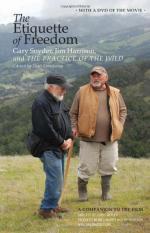|
This section contains 721 words (approx. 3 pages at 300 words per page) |

|
SOURCE: "The Importance of Nothing: Absence and its Origins in the Poetry of Gary Synder," in Contemporary Literature, Vol. XXVIII, No. 1, Spring, 1987, pp. 41-66.
In the excerpt below, Norton discusses Snyder's use of imagery.
In his early wilderness poetry, Gary Snyder builds absences into the structure, imagery, and syntax of his texts in order to inscribe the essential Zen Buddhist perception of the identity of sunyata (Emptiness) and tathata (suchness, objective reality) in the form itself of each poem.
In the West, we are accustomed to conceiving the world dualistically. We define both material objects and ideas in terms of binary oppositions (rough/smooth, good/evil). We oppose the real to the ideal, valorizing one at the expense of the other or, with Plato, redefining the one as the other. Buddhism subverts such definitional projects by questioning the capacity of abstract thought to comprehend or articulate reality in...
|
This section contains 721 words (approx. 3 pages at 300 words per page) |

|


